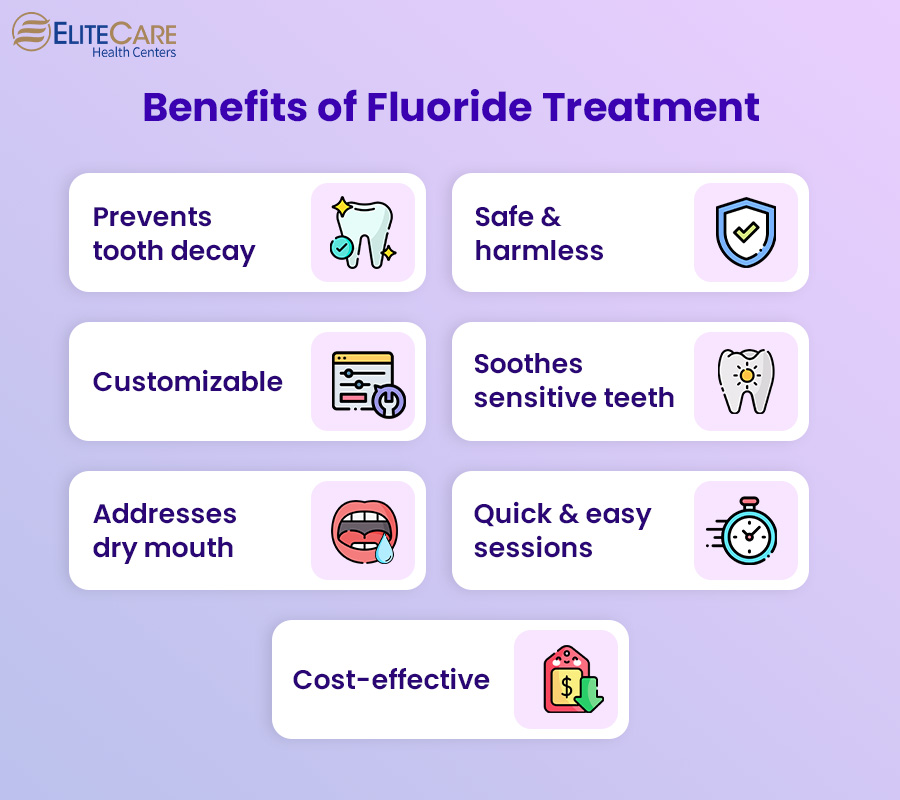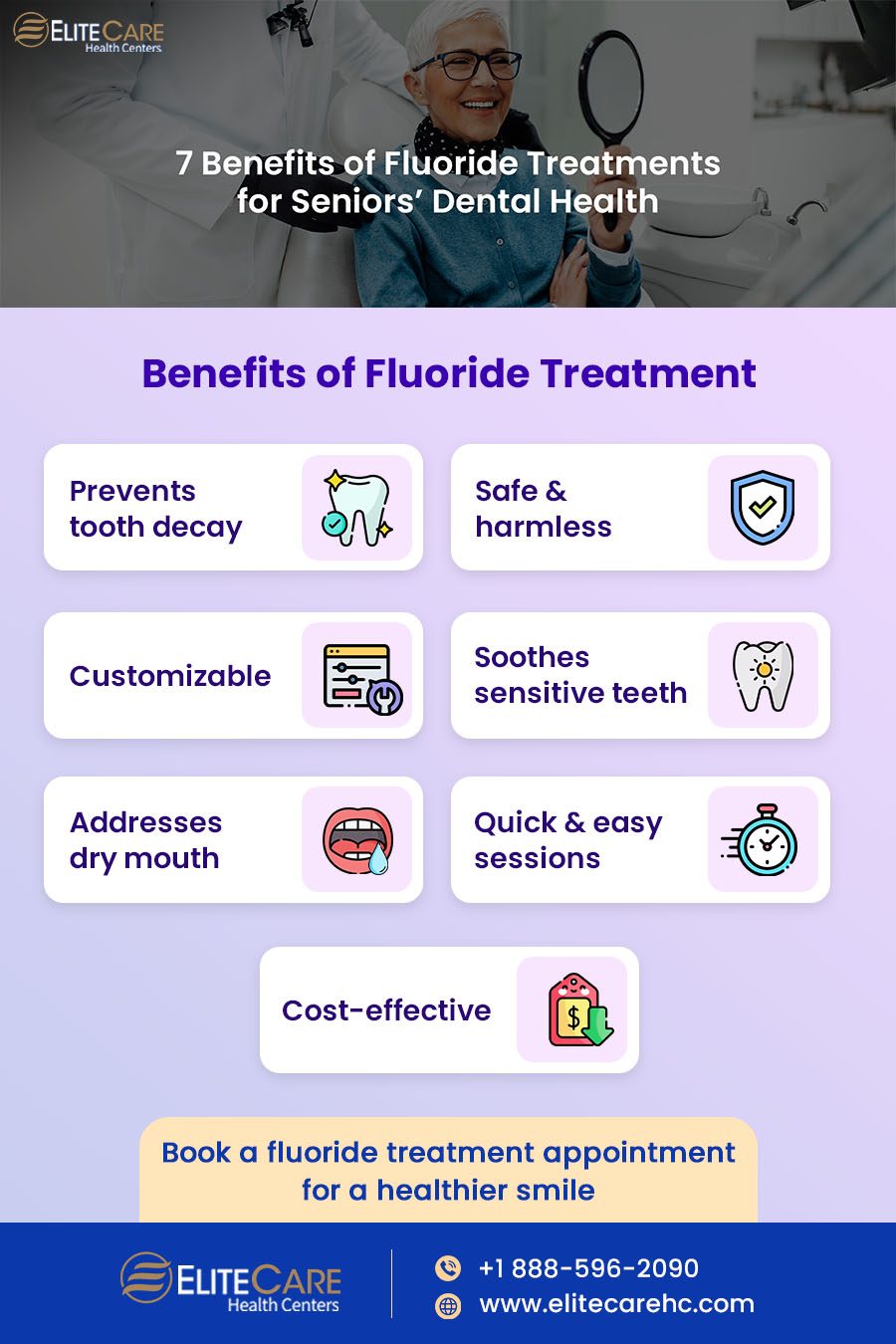
Aging brings changes in all parts of the body, including teeth and gums. Maintaining oral health is essential in seniors to prevent common oral health problems. Fluoride treatment can be a key factor, as it helps prevent tooth decay, cavities, reduce sensitivity and strengthens teeth.
Keep reading to learn more about the benefits of fluoride treatment, its safety measures, and how it can improve oral health in seniors!
What are Fluoride Treatments?
Fluoride treatment is a type of dental treatment that involves applying fluoride as a gel or foam or varnish to the teeth to prevent tooth decay and strengthen them. Fluoride is a naturally occurring mineral in water, soil, and certain foods and has significant benefits for dental health.
Benefits of Fluoride Treatment

1. Fluoride treatments can help prevent tooth decay
Our teeth may become more vulnerable to decay as we age. Fluoride treatments effectively prevent tooth decay in seniors by strengthening the enamel of the teeth and making them more resistant to acid erosion.
Due to weakened immunity, dry mouth, and gum recession, seniors’ teeth become more vulnerable to decay and cavities. Fluoride treatment strengthens the tooth enamel by maintaining the mineral bonds holding the teeth together. This makes the teeth more resistant to acid erosion and decay. These treatments can also help reduce tooth sensitivity and promote overall oral health. Fluoride treatments are an important aspect of dental care for older adults, as they can help prevent various dental issues and keep seniors’ teeth strong and healthy.
The benefits of preventing tooth decay in seniors are numerous. First and foremost, preventing tooth decay can help seniors maintain their natural teeth and avoid expensive dental treatments such as crowns, bridges, and dentures. Additionally, preventing tooth decay can help seniors avoid painful dental problems such as toothache, abscesses, and gum disease.
2. Fluoride treatments are safe
There are concerns about the safety of fluoride treatments, particularly for seniors with existing health conditions or those taking medications- that could react with fluoride. However, fluoride treatment is generally safe when administered properly by a dentist.
The American Dental Association (ADA) recommends fluoride treatments for all adults, including seniors, as part of a comprehensive dental care plan. The fluoride concentrations used in dental treatments are generally low and safe for most people. It can be hazardous when taken in high concentrations. The levels used in dental treatments are much lower than those that could cause harm. Additionally, dental service providers take precautions to minimize the risk of accidental ingestion or other adverse effects during treatment.
In rare cases, some older adults may experience mild side effects from fluoride treatments, such as nausea or an upset stomach. However, these side effects are typically temporary and get resolved on their own.
3. Fluoride treatments can be customized
To meet individual needs, fluoride treatments at the dentist can be tailored- as every patient’s oral health status is unique. A dental service provider can determine the appropriate fluoride treatment for a senior patient by considering their age, overall health, and dental history.
For instance, a senior prone to cavities may benefit from a stronger fluoride concentration, while a senior with sensitive teeth may require gentler treatment. Additionally, seniors at increased risk for tooth decay and cavities may benefit from fluoride treatment and at-home mouth rinses.
To determine the appropriate fluoride treatment for a senior patient, a dental service provider will typically begin with a comprehensive oral exam to assess the patient’s overall oral health. They may also review the patient’s medical history and ask about medications they are taking, as some medications can affect fluoride absorption.
Based on this information, the dental professional recommends the most appropriate fluoride treatment for the patient’s needs. This may involve a fluoride rinse, gel, foam, or varnish and may be applied in the clinic or provided for at-home use.
4. Fluoride treatments can help with sensitive teeth
Seniors may be more prone to tooth sensitivity due to various factors such as gum recession, worn enamel, and age-related changes in the nerves of the teeth. Fluoride treatments can be beneficial for seniors who experience tooth sensitivity.
The treatments address tooth sensitivity by strengthening the teeth’ enamel and reducing the nerve endings’ sensitivity. This can help seniors enjoy hot or cold foods and beverages without experiencing pain or discomfort. Additionally, fluoride treatments can help protect against further enamel erosion and prevent the development of cavities that can exacerbate tooth sensitivity.
5. Fluoride treatments can help with dry mouth
Xerostomia or dry mouth is caused in seniors due to certain medications, aging, smoking tobacco, or snoring. The decrease in saliva production in the mouth leads to various oral health issues, including tooth decay, gum disease, and bad breath.
Fluoride treatments address dry mouth by increasing saliva production and protecting the teeth against decay. This is because fluoride remineralizes the teeth and makes them more resistant to acid attacks from bacteria in the mouth. Additionally, addressing dry mouth can have broader health benefits for seniors, as it reduces the risk of developing other health issues associated with dry mouth, such as difficulty swallowing, infections, and nutritional deficiencies.
6. Fluoride treatment sessions are easy and quick
Professional fluoride treatment sessions are an excellent option. They are typically quick and easy, taking a few minutes to complete. The application is simple and painless. The treatment is usually applied to the teeth using a brush, swab, tray, or mouthwash. The dental service provider may use suction or air to dry the teeth before application.
In addition to being quick and easy, the treatment is non-invasive and requires no downtime or recovery time. Making them an ideal option for seniors with limited mobility or those concerned about any discomfort.
7. Fluoride treatments are cost-effective
The Centers for Disease Control and Prevention have named water fluoridation as 1 of 10 great public health achievements of the 20th century. It is a cost-effective and proven public health measure. When fluoride is added to public water supplies at optimal levels, it can provide a simple and effective way to improve oral health for people of all ages.
The cost of fluoride treatments at the dentist varies depending on the type of treatment and location. Still, they are generally less expensive than other dental procedures like fillings, root canals, and extractions. Fluoride treatments can save seniors money in the long run by helping to prevent tooth decay and other oral health issues. Additionally, seniors can avoid more extensive and expensive dental procedures. Furthermore, many dental insurance plans cover the cost of fluoride treatments, making them an even more affordable option for seniors.
Overall, fluoride treatments are cost-effective for seniors to maintain good oral health and prevent tooth decay. Seniors interested in these treatments should discuss their options with their dental professionals to determine the most appropriate treatment plan for their needs and budget.
Read More: Can Dental Problems Affect Physical Health?
Takeaway
Overall, fluoride treatments are cost-effective for seniors to maintain good oral health and prevent tooth decay. Seniors interested in these treatments should discuss their options with their dental professionals to determine the most appropriate treatment plan for their needs and budget.
Fluoride treatments at the dentist can help maintain good oral health and overall quality of life. Poor dental health can cause embarrassment and social isolation and make eating and speaking difficult. By preventing tooth decay and maintaining good oral health, seniors can continue enjoying the foods they love, communicating confidently, and maintaining an active social life. Seniors interested in fluoride treatments can connect with medical clinic’s primary service provider and discuss our dental services and preventative measures for their dental health.






